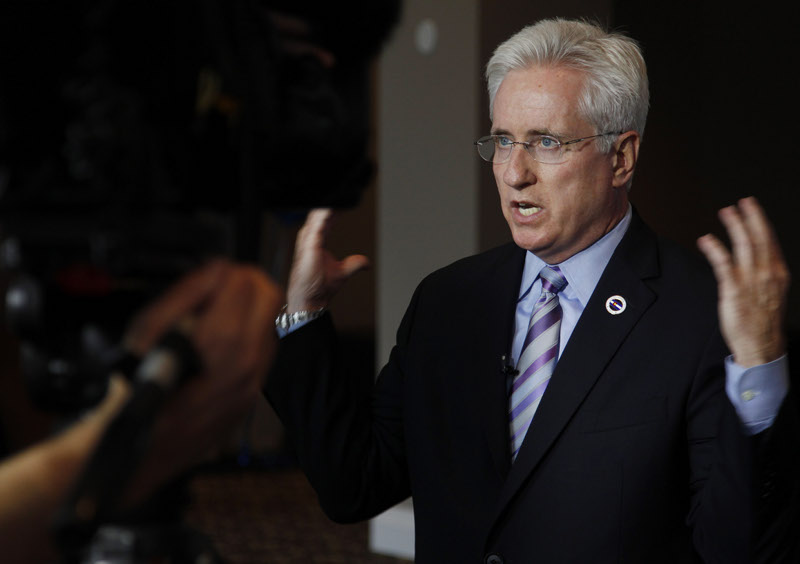Updated: September 11, 2013, 12:59 AM
Colorado Senate President John Morse (D) and state Sen. Angela Giron (D) were both thrown out of office in recall elections on Tuesday over their votes in support of stricter gun control measures.
In late developments in Colorado, Morse conceded the election and the Associated Press called Giron’s defeat.
After the results for Morse came in, the National Rifle Association, which supported the recalls and spent heavily in the recalls, quickly released a statement celebrating its victory.
“A historic grassroots effort by voters in Colorado’s Senate District 11 has resulted in the recall of Colorado Senate President John Morse (D),” the NRA statement read. “The people of Colorado Springs sent a clear message to the Senate leader that his primary job was to defend their rights and freedoms and that he is ultimately accountable to them – his constituents, and not to the dollars or social engineering agendas of anti-gun billionaires.”
Tuesday’s recall election will likely be interpreted as a major win for opponents of new gun laws and a signal that lawmakers at every level of government could face serious punitive measures for helping to pass them.
But perhaps the nation’s most prominent supporter of gun control, New York City Mayor Michael Bloomberg, released a statement early Wednesday through his group, Mayors Against Illegal Guns, holding tight to the earlier legislative victories.
“Tonight’s results do not change the fact that Coloradans are safer today because of the leadership demonstrated by Senators Morse, Giron and the rest of the Colorado lawmakers who voted for the bills,” Bloomberg said. “The new laws they championed remain in place, despite the gun lobby’s best efforts to stop them from passing.”
Giron and Morse became the targets of recall efforts after helping to pass new gun restrictions including background checks for gun purchasers and limits on the size of ammunition magazines. The laws were spurred by shooting massacres like one in Aurora, Colo. in July 2012, which resulted in 12 dead and 58 people injured.
“They blamed Colorado gun owners for a tragedy they did not commit,” Dudley Brown, the executive director of Rocky Mountain for Gun Owners, told NPR. Brown’s group strongly opposed the gun laws.
Critics of the laws subsequently took steps to initiate the first ever recall of two state lawmakers in Colorado’s history.
The election results will be interpreted nationally as an important marker in the ongoing conflict between advocates and opponents of tightening gun restrictions. Indeed, the national view was that the recalls were an indicator as to whether national pro-gun groups had found a new way to fight gun restrictions. Observers and those involved in the recall elections said that if both Morse and Giron were recalled, pro-gun groups would look to use the same type of recall formula elsewhere in the country. That’s why prominent national gun control groups like New York Mayor Michael Bloomberg’s Mayors Against Illegal Guns got involved. The two sides pumped millions of dollars into the races.
The recalls also expanded beyond a debate on guns. Much of the campaigning up to Tuesday’s recall focused on other issues, in part, because of the strong anti-abortion stances of Bernie Herpin and George Rivera, the two Republican lawmakers who would replace Giron and Morse. National groups like Emily’s List and Sen. Kirsten Gillibrand’s (D-NY) Off the Sidelines political action committee raised money in support of Morse and Giron.
The recall had local implications, too. Hanging in the balance was the size of Democrats’ majority in the state Senate as well as the leadership of the chamber. Democrats will continue to control the governor’s mansion, the state House of Representatives and the Senate. But if Tuesday’s early results held, the margin in the Senate would be slightly smaller.
In the lead up to the recall, supporters of Giron and Morse worried that if the senators ended up being thrown out, recalls would become a regular part of the political cycle in the state.
“I think the biggest fear in all of this that we all have is that this is going to become the normal cycle. That in every off-year we’re going to have these recalls,” Democratic consultant Ellen Dumm, who was involved in the anti-recall efforts, told TPM.






